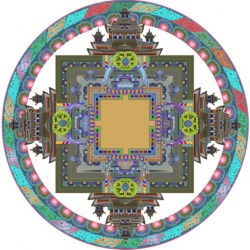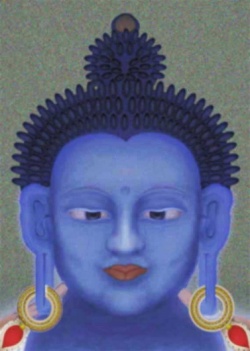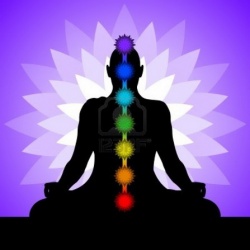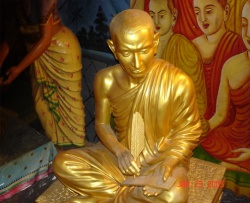Has my dog got Buddha-nature?
At the weekend, we picked up Lily - our new dog, a whippet, aged 10 weeks.
She's affectionate, has long legs, a pointed nose, bluish eyes and soft ears. She likes to eat Weetabix, dog chews, carpets, grass and bonsai trees. She's just been to the vet and she's in great shape. But as a Zen Buddhist the obvious question of course is - does she have Buddha-nature? 'Does a dog have Buddha-nature?' is a question that Joshu was famously asked by a monk. His reply of 'mu' (meaning 'not' or 'nothing') became the first koan studied by most monks in the Rinzai tradition.
In China at that time a dog was considered to be lowly in a way that dogs in the west generally are not - as when Dogen declared that 'those who let their hair grow are lower than dogs!'. So the question had a subtly different meaning. Essentially he was asking whether even the lowliest beast has Buddha-nature. A dog? What about a rat?
What is Buddha-nature? Does it mean that there is a little Buddha inside everyone like a little homunculus? Or does it just mean that we are potential Buddhas? Buddha-nature is a translation of the Sanskrit Tathagata-garbha or 'Buddha-womb' and is described by certain Mahayana sutras as a truly real, but hidden element within the purest aspect of consciousness in all sentient beings. A dog is a sentient being, so why did Joshu not simply reply 'yes'? Joshu was a pretty sharp fellow so he wouldn't get such a basic doctrinal point wrong.
The Tathagata-womb is sometimes described as a pure, unchanging and permanent element like a jewel. And proponents of this doctrine have sometimes been accused of contaminating Buddhism with Hindu ideas. The Hindu concept of the Atman as a permanent, undying essence or Self that dwells in all beings is described in the Upanishads. And the early Buddhist scriptures - the Pali Canon - can quite easily be seen as a reaction to the teachings that came from those texts. The Buddha unambiguously rejected any sort of Atman or separate self in his doctrine of Anatman ('no-atman'). So why was this apparent contradiction introduced by the authors of the Mahayana sutras?
There is a clue in one of the sutras which introduced this concept, the Lankavatara Sutra. In this sutra, the Buddha states that the Tathagata-womb or inherent Buddha-hood is not the same as the atman but is another way of teaching emptiness or no-self.
What I teach is Tathagatahood [or Buddahood) in the sense of Dharmakaya, Ultimate Oneness, Nirvana, emptiness, unbornness, unqualifiedness, devoid of will-effort. The reason why I teach the doctrine of Tathagatahood is to cause the ignorant and simple-minded to lay aside their fears as they listen to the teaching of egolessness and come to understand the state of non-discrimination and imagelessness...
...The doctrine of the Tathagata-womb is disclosed in order to awaken philosophers from their clinging to the notion of a Divine Atman as a transcendental personality, so that their minds that have become attached to the imaginary notion of a "soul" as being something self-existing, may be quickly awakened to a state of perfect enlightenment.
So the Buddha-nature doctrine is positive way of teaching emptiness, one that side-steps the problems of fear of annihilation and nihilism that sometimes arise as a misunderstanding of Buddhism. Yet it's not that one is the real teaching and the other one is a myth. Nirvana is not something that can be understood as a theory or grasped as an intellectual philosophy. Buddhist philosophy is intended to indicate the Way; it isn't intended as objective or final truth. Sometimes negation is needed and sometimes affirmation.
Some thinkers have tried to avoid the apparent contradiction between the Buddha-nature and Anatman ('no-inherent-nature') doctrines by arguing that Buddha-nature refers only to potential Buddhahood. But the Tathagata-garbha sutras state unambiguously that this isn't the case. It would also degrade it into a purely conventional metaphysical doctrine and miss out on the profundity of Joshu's mu.
To say that all beings already have Buddha-nature is to say that right here and now there is no separation between things - apparent separation is constructed by the mind. This is the same as saying that there is no self. The point is that there is no boundary - it doesn't matter which side of the imaginary boundary you think is real and which is illusionary - it's all an illusion. It's another way of saying that Buddhas and ordinary beings are of one substance; or that ordinary mind is Buddha; or that difference and sameness are in harmony; or that form is emptiness and emptiness is form. The message is the same.
It's a true and useful concept when applied internally as a way to realise that emptiness is present everywhere its just that our real nature is obscured by confusions. But when turned outwards as some sort of metaphysical speculative theory it's worse than useless.
Joshu's mu, I think is to negate Buddha-nature and no-Buddha-nature, Buddhas and ordinary beings, self and other, all categories and mistaken questions, leaving only bare reality, just as it is, unadorned. So, does Lily have Buddha-nature? Pass me the dog chew.
This is Mumon's comment on Joshu's Dog koan:
To realize Zen one has to pass through the barrier of the patriarchs. Enlightenment always comes after the road to thinking is blocked. If you do not pass the barrier of the patriarchs or if your thinking road is not blocked, whatever you think, whatever you do, is like a tangling ghost.
You may ask: What is a barrier of a patriarch? This one word, Mu, is it. This is the barrier of Zen. If you pass through it you will see Joshu face to face. Then you can work hand in hand with the whole line of patriarchs. Is this not a pleasant thing to do?
If you want to pass this barrier, you must work through every bone in your body, through every pore in your skin, filled with this question: What is Mu? and carry it day and night. Do not believe it is the common negative symbol meaning nothing. It is not nothingness, the opposite of existence. If you really want to pass this barrier, you should feel like drinking a hot iron ball that you can neither swallow nor spit out.
Then your previous lesser knowledge disappears. As a fruit ripening in season, you subjectivity and objectivity naturally become one. It is like a dumb man who has had a dream. He knows about it but he cannot tell it. When he enters this condition his ego-shell is crushed and he can shake the heaven and move the earth. He is like a great warrior with a sharp sword. If a Buddha stands in his way, he will cut him down; if a patriarch offers him any obstacle, he will kill him; and he will be free in his way of birth and death. He can enter any world as if it were his own playground.
I will tell you how to do this with this koan: Just concentrate your whole energy into this Mu, and do not allow any discontinuation. When you enter this Mu and there is no discontinuation, your attainment will be as a candle burning and illuminating the whole universe.
Has a dog Buddha-nature?
This is the most serious question of all.
If you say yes or no,
You lose your own Buddha-nature.
The Significance Of 'Tathagatagarbha' - A Positive Expression Of 'Sunyata'
http://en.wikipedia.org/wiki/Tathagatagarbha
Note: The Shentong and Rangtong schools of Tibetan Buddhism argued about this and the nature of emptiness for years, the former saying that Sunyata is emptiness of other and the latter (more accurately) saying that Sunyata is emptiness of self. But these amount to the same thing: no separation.




